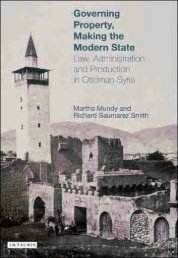The Young Turk Period, 1908-1918 - PSI424
The Young Turk Period, 1908-1918 - PSI424
The Young Turk Period, 1908-1918 - PSI424
Create successful ePaper yourself
Turn your PDF publications into a flip-book with our unique Google optimized e-Paper software.
280 <strong>The</strong> Rise of Modern <strong>Turk</strong>ey, 1808-1975<br />
It was one Hafiz Dervis. Vahdeti who focused this discontent into an attempt at<br />
counterrevolution. Apparently a member of the Bektasi order, he began to publish<br />
a newspaper called Volkan (Volcano) on November 10, <strong>1908</strong>, presenting a mixed<br />
message of mystic and popular Islam and strong opposition to the secularism of the<br />
government as well as the influence of the minorities and foreign representatives. 14<br />
Within a short time he formed the Society of Islamic Unity (Ittihad-t Muhammedi<br />
Cemiyeti), intended to replace the Constitution with the §eriat and use Islam to<br />
modernize and rescue the empire. <strong>The</strong> secular schools and courts would be replaced<br />
with their Islamic counterparts and the authority of the sultan restored as the best<br />
means of rescuing the empire. While Abdulhamit apparently refused to provide<br />
financial support for the new organization and newspaper, it appears that it was<br />
helped by other elements in the palace, with one of the sultan's sons, Burhaneddin<br />
Efendi, actually becoming a member. 15 Volkan now began an active campaign<br />
against the government. <strong>The</strong> Society of Islamic Unity declared its intention to<br />
establish a regime that would fulfill the basic duties of Islamic government - to<br />
protect and promote the §eriat and the basic practices of Islam, spread the light<br />
(nur) of Divine Unity throughout the empire, and free Muslims all over the world<br />
from the tyranny of non-Muslim oppression. Its immediate aims were to promote<br />
the interests of Muslims, support the Islamic principle of consultation (tnesveret)<br />
as the basis of government, secure wider application of the §eriat in the Meceile<br />
code used in the secular courts, and to encourage the development of Muslim morals<br />
and traditions in the daily lives of all Muslims in the empire. 16<br />
On April 3, 1909, the society held its first mass meeting at the Aya Sofya<br />
mosque, using the celebrations of the birthday of the Prophet to gain further<br />
popular support. Vahdeti harangued the crowd with appeals for struggle against<br />
secularism, stating that the Muslims had the same right as non-Muslims to organize<br />
to defend their ideals and rights. 17 Chapters were organized in other cities, and<br />
these in turn began to send popular petitions to the government demanding that the<br />
§eriat be restored. <strong>The</strong> society soon had members in the First Army of Istanbul,<br />
key to gaining control of the city. It cooperated with the Liberal Union group and<br />
campaigned against the government. A groundswell of mass support soon pushed<br />
the conservatives to open action. 18 During the night of April 12/13, the soldiers of<br />
the First Army joined the students of religion before the Sultan Ahmet mosque,<br />
marched to the nearby Parliament building, and surrounded it. <strong>The</strong> grand vezir had<br />
been aware of the rising tension but had not expected such a sudden explosion; thus<br />
when he heard of the affair, he sent only his chief of police to see what was<br />
happening. <strong>The</strong> demonstrators presented him with a series of demands: the government<br />
would have to resign and send many deputies into exile; the rules of the<br />
§eriat would be obeyed in full; all military officers removed by the government<br />
would be recalled, and the CUP influence in the army brought to an end. Ahmet<br />
Riza would be removed as president of the Chamber of Deputies and a "true Muslim"<br />
appointed in his place. Word of the demands was sent to the deputies gathered<br />
in the building, but since they had no authority to comply, the tension mounted. <strong>The</strong><br />
mob began flooding into the Parliament buildings, and as the deputies fled in terror<br />
two were killed, apparently under the mistaken impression that they were Ahmet<br />
Riza and Hiiseyin Cahit Bey, editor of the pro-CUP paper Tanin. <strong>The</strong> government<br />
faced a crisis. <strong>The</strong> minister of war refused to order the army to disperse the rebels.<br />
Grand Vezir Hiiseyin Hilmi was powerless; he rushed to the Yildiz Palace and<br />
presented his entire cabinet's resignation to the sultan. Abdulhamit not only accepted<br />
the resignations but also sent his first secretary to Aya Sofya with an order












